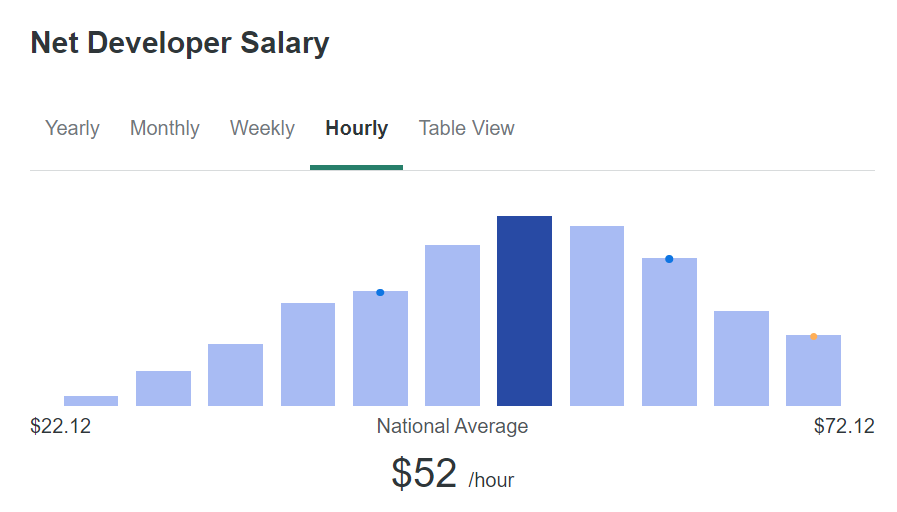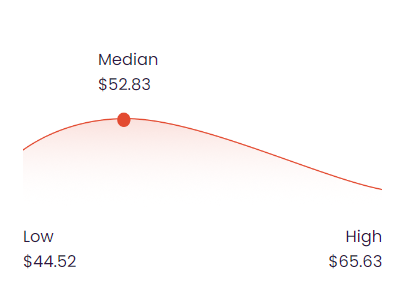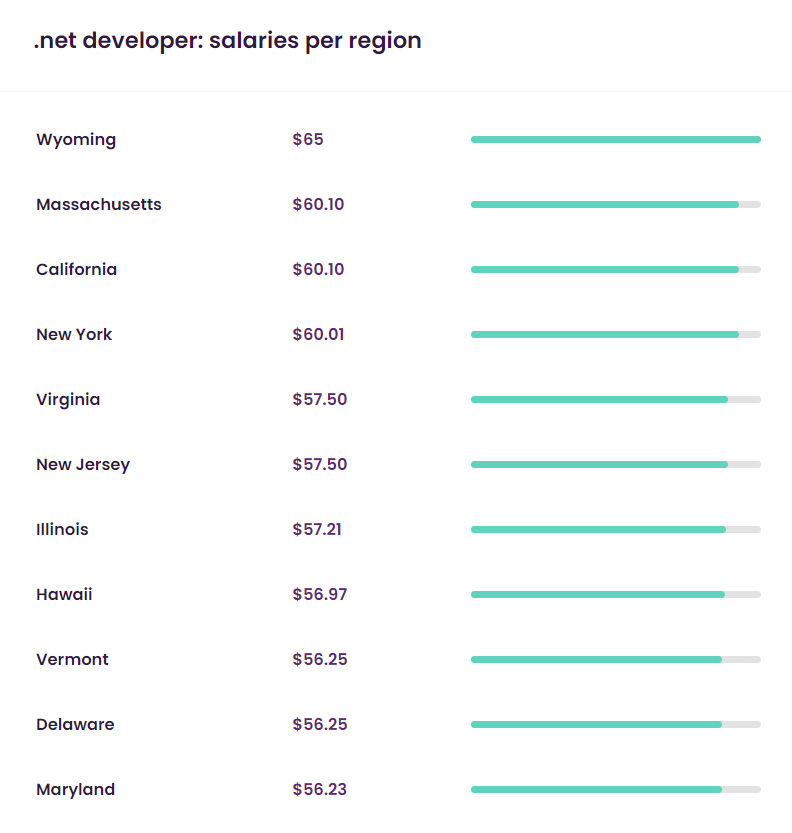Understanding the .NET Developer Pay Scale: An Hourly Rate Guide for 2023
In the USA, .NET developers have an average hourly compensation of $51. However, there’s a considerable range in their earnings, spanning from $36/hr on the lower end to $75/hr at the upper end. This rate disparity can be attributed to various factors, including the developer’s experience level and geographic location. Notably, senior developers command significantly higher rates compared to their junior or intermediate counterparts.
Table of Contents
This guide aims to clarify these aspects, providing an in-depth understanding of the current hourly rates for .NET developers and offering insights into the considerations that influence these costs. Whether you’re a business seeking to hire .NET developers or you’re a developer looking to benchmark your own rates, this guide provides a comprehensive overview of the dynamic landscape of .NET development costs.
According to ZipRecruiter .NET developers in the United States have an average hourly compensation of $52.43. However, there’s a considerable range in their earnings, spanning from $44.23/hr on the lower end to $60.34/hr at the upper end. This rate disparity can be attributed to various factors, including the developer’s experience level and geographic location. Notably, senior developers command significantly higher rates compared to their junior or intermediate counterparts.
The Average Hourly Rate Edition for .NET Developers
In 2023, the .NET developer job market in the United States showcases a broad range of hourly rates. The average hourly rate stands at $52.43 an hour, providing a general benchmark for .NET developers at various stages in their careers.
However, the scale can tip to as high as $72.12 for the top-tier developers with extensive experience and specialized skill sets. On the other hand, those entering the field can expect to start with rates around $22.12 an hour. A significant amount of .NET developer incomes fall between $44.23 and $60.34, marking the 25th and 75th percentiles, respectively. A .NET developer’s earning potential is primarily influenced by their skill level, years of experience, and geographical location, each playing a major part in shaping their career path.
.NET Developer Hourly Rates Across Experience Levels and Locations
The cost of hiring .NET developers varies depending on their experience level and location. North America has the highest rates, ranging from $22-$72, followed closely by Western Europe and Australia.
South America and Eastern Europe provide more cost-effective rates, with developers’ costs ranging between $11-$46 and $10-$40. Asia’s rates span from $10-$35, while Africa offers the most affordable rates, ranging from $8-$30. This shows the global diversity in the cost of hiring .NET developers, dictated by regional economics and the developers’ experience level.
| Region | Entry-Level | Mid-Level | Senior-Level |
|---|---|---|---|
| North America | $22 - $50 | $35 - $60 | $47 - $72 |
| South America | $11 - $23 | $18 - $35 | $25 - $46 |
| Western Europe | $18 - $35 | $25 - $45 | $38 - $62 |
| Eastern Europe | $10 - $20 | $16 - $32 | $22 - $40 |
| Australia | $16 - $25 | $20 - $40 | $30 - $60 |
| Asia | $10 - $18 | $14 - $25 | $20 - $35 |
| Africa | $8 - $15 | $10 - $20 | $18 - $30 |
Statistics from talent.com suggest that even in the United States, the salary obtained by .NET developers varies according to the state. The highest salary is obtained by developers in Wyoming followed by developers in Massachusetts, California, New York, Virginia, New Jersey, Illinois, Hawaii, Vermont, and Delaware coming in tenth place.
Further, talent.com details that in the United States, the average hourly rate for a .NET developer is $51.68 per hour. Entry-level positions start at $44.51 per hour, while the most experienced workers can earn up to $65.63 per hour.
A Comparison of .NET Developer Hourly Rates by Industry
The average salary for a .NET developer can significantly change across different industries. At the high end, the retail industry offers the most attractive average salary, standing at $45.50 per hour. Close behind is the finance industry, where .NET developers can expect to earn an average salary of $44.95.
However, it is important to mention that not all industries pay equally; for example, in the professional industry, .NET developers earn an average salary of $42.51, marking the lowest among these industries. The differences highlight the impact that the nature of these industries can have on .NET developers’ earning potential, giving insight into important considerations for businesses looking to hire .NET developers.
| Industry | Average Hourly Rate |
|---|---|
| Retail | $45.50 |
| Finance | $44.95 |
| Automotive | $44.57 |
| Manufacturing | $44.42 |
| Health Care | $44.28 |
| Technology | $43.56 |
| Telecommunication | $43.08 |
| Insurance | $42.82 |
| Professional | $42.51 |
Highest Paying Career Paths for .NET Developers
There are several advanced roles within the .NET framework that come with added responsibilities as well as greater salaries. These roles represent the potential growth paths for .NET developers seeking to enhance their careers and financial earnings. For instance, a .NET developer might aspire to become a Solutions Architect, .NET Software Engineer, or a Technical Lead, roles that require a deep understanding of .NET technologies, strong leadership skills, and the ability to manage complex projects. These positions demand a blend of technical expertise and managerial experience, making them some of the highest-paying roles in the industry. Hence, as .NET developers progress in their careers, exploring these roles could be a wise move to increase their earning potential.
| Position | Average Hourly Rate |
|---|---|
| .NET Application Architect | $79 - $84 |
| .NET Solution Architect | $67 - $75 |
| .NET Architect | $63 - $77 |
| .NET Technical Architect | $58 - $70 |
| Senior Software Engineer .NET | $54 - $70 |
| Senior .NET Web Developer | $50 - $66 |
| Senior .NET Software Developer | $49 - $67 |
| Full Stack .NET Developer | $48 - $58 |
| C .NET Software Developer | $43 - $52 |
| VB .NET Developer | $38 - $55 |
The Impact of .NET Skills on Developers’ Hourly Rates
Beyond simply categorizing developers as entry-level, mid-level, or senior, specific skills within the .NET framework significantly influence a developer’s salary. For instance, developers specializing in in-demand technologies such as ASP.NET and .NET Core can command higher hourly rates between $25 to $70 and $30 to $75. Xamarin, a . NET-based framework for building native apps, is another valuable skill, with developers capable of charging $35 to $80 per hour.
Mastery of foundational web technologies such as C#, JavaScript, HTML/CSS, and Bootstrap also enhances earning potential, with rates spanning from $20 to $75 per hour. Moreover, knowledge of PHP, a skill beyond the .NET industry, can add versatility to a .NET developer’s profile, thereby positively influencing their salaries. Thus, it’s clear that possessing specific, high-demand skills within the .NET framework can significantly elevate a developer’s earning potential.
| Technology | Average Hourly rate |
|---|---|
| ASP .NET | $25 - $70 |
| .NET Core | $30 - $75 |
| jQuery | $25 - $70 |
| Xamarin | $35 - $80 |
| C# | $20 - $70 |
| PHP | $20 - $65 |
| JavaScript | $30 - $75 |
| HTML/CSS | $20 - $65 |
| Bootstrap | $25 - $70 |
How .NET Developers’ Hourly Rates Stack Up Against Other Technologies
The hourly rates for .NET developers vary based on several factors such as expertise, location, and specialized skills, with a general range of $22 to $72 per hour. However, when compared to other backend and frontend technologies, we observe a wide array of rates. Java and Python developers, for example, can command rates between $20-$80 and $30-$100 per hour, respectively. Ruby developers typically charge between $30-$80 per hour.
Frontend technologies, such as React.js, Angular, and Vue.js, see rates ranging from $20 to $80 per hour. Moreover, rates for developers with skills in Django, Swift, Laravel, Golang, and Kotlin range widely from $20 to $120 per hour. It’s clear that while .NET developers command competitive rates, the rates for other technologies can change significantly based on demand, complexity, and the specific framework or language in question.
| Technology | Average Hourly Rate |
|---|---|
| Java | $20 - $80 |
| Python | $30 - $100 |
| Ruby | $30 - $80 |
| React.js | $30 - $80 |
| Angular | $25 - $75 |
| Vue.js | $20 - $70 |
| Django | $30 - $100 |
| Swift | $30 - $120 |
| Kotlin | $25 - $90 |
| Go | $30 - $80 |
| Laravel | $20 - $70 |
Conclusion
This blog post provides an in-depth look at the hourly compensation for professionals in the .NET development field. It illustrates how factors such as experience, geographical location, and industry demand influence these rates. This guide is an invaluable resource for .NET developers seeking to understand their earning potential and for employers aiming to set fair and competitive hourly wages in this dynamic and evolving tech sector. You can check out our .NET Developer Salary Guide to learn about the annual salary rates you can earn in the US and across the world. We bring you a complete .NET Developer Hiring Guide along with the .NET Developer Job Description and .NET Interview Questions guide which will help you in the process of hiring a .NET developer in 2023.
Table of Contents











